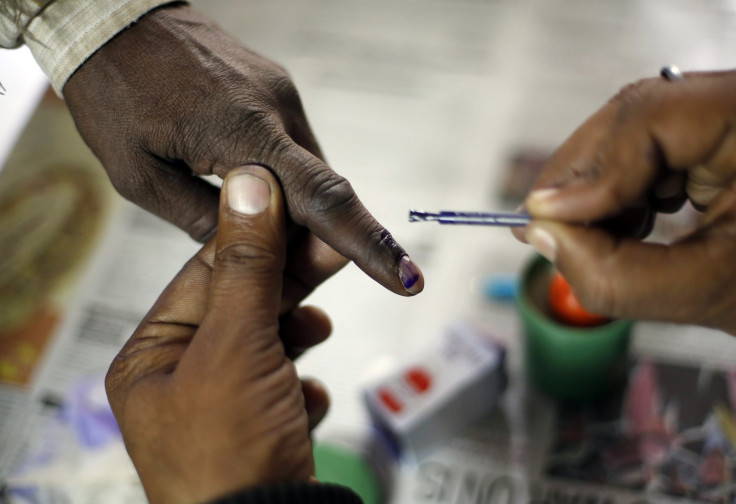Why A Local Election In India's Capital Delhi Could Impact Prime Minister Narendra Modi

NEW DELHI -- On Saturday, India’s capital Delhi voted to give itself a new state government, in what has perhaps become the most keenly watched electoral contest in the country since it elected a new federal government in May last year.
In December 2013, Delhi had voted out a Congress party government under the then-Chief Minister Sheila Dikshit. While the Hindu nationalist Bharatiya Janata Party (BJP) had secured the largest number of seats in the 70-member Delhi assembly, it could not form a government as it did not reach the halfway mark required to do so. Bureaucrat-turned-Right to Information and anti-corruption activist, Arvind Kejriwal of the then newly formed Aam Aadmi Party (AAP), which had secured the second-largest number of seats, became the city’s chief minister, supported from the outside by the Congress party, which was relegated to a distant third position. Kejriwal had handsomely defeated Dikshit in the prestigious New Delhi seat in central Delhi, which counts among its voters top politicians and bureaucrats.
However, after just 49 days in office, Kejriwal resigned in February last year after he failed to get a crucial anti-corruption legislation passed in the city’s assembly. Since then, the capital has been under federal rule.
In the months following the 2013 Delhi election, the BJP won the federal election to the country’s national parliament, in a landslide verdict that led to its leader Narendra Modi, becoming the first prime minister to head a majority government since 1984. The BJP-led National Democratic Alliance government had replaced a decade-old Congress party-led United Progressive Alliance regime.
In the federal election, riding on a strong pro-Modi wave, the BJP won all the seven parliamentary seats from Delhi, while both the AAP and the Congress drew a blank. While the AAP won just four seats, all from the northern state of Punjab, the Congress’ national tally was at an all-time low of 44. In fact, Kejriwal and Modi were pitted against each other in the holy city of Varanasi in Uttar Pradesh state. Modi had won that contest, defeating his counterpart comfortably.
Since May, Modi’s BJP or its allies have either stormed to power or have retained their seats during nearly all the state-level polls that have been held.
In Delhi this time, the main battle again appears to be between the BJP and the AAP. Several opinion polls toward the end of the election campaign have either predicted a dead heat between the two parties, or just a slender lead for either.
If these opinion polls are to be believed, the AAP appears to have gained significant ground against the BJP since last year, when polls had shown a landslide win for the latter. Interestingly, the AAP’s gains appear to have come after the BJP announced police officer-turned-activist Kiran Bedi as its chief ministerial candidate.
In fact, Kejriwal and Bedi, now political adversaries, are both Indian Institute of Technology-trained former civil servants. Kejriwal was in the Indian Revenue Service, while Bedi was the first woman Indian Police Service officer. Both were once comrades in the India Against Corruption movement of 2011, which was led by activist Anna Hazare.
On Saturday, both Bedi and Kejriwal appeared strong in their individual constituencies and whose party would eventually win the election remains unclear. The results are slated to be announced on Feb. 10.
General voters who spoke to International Business Times in either constituency were near unanimously confident that their respective candidates would win the seats and also become the chief minister. While Kejriwal is fighting to retain his New Delhi seat, Bedi is contesting from Krishna Nagar, a traditional BJP stronghold, which she is expected to win.
Laxman Singh, an autorickshaw driver in the city said he would vote for the AAP, just as he had done in the 2013 Delhi election and the 2014 federal election. His colleague Vijay Kumar said he had not made up his mind yet. “I think I will vote for the BJP this time as Bedi is Modi’s choice,” he said, adding that while he had voted for AAP in 2013, he went with Modi’s BJP in 2014. “But I will have to concede, Kejriwal is also a good man, and so it is a tough choice.”
The Delhi election is being keenly watched as it is seen as the first possible political challenge to the Indian prime minister. Ever since he became the chief minister of the western Indian state of Gujarat in October 2001, Modi has never lost an election that has been directly fought under his watch.
According to India's election commission, 63 percent of the voters had exercised their right till an hour before voting closed.
© Copyright IBTimes 2025. All rights reserved.



















